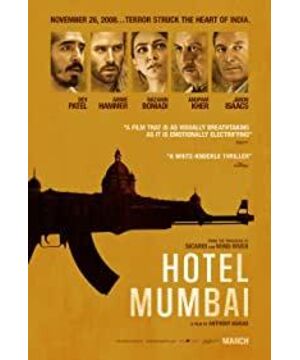The film truly reproduces the "India 9.11" Mumbai terrorist attack that shocked the world. In November 2008, the famous Taj Mahal Hotel was accidentally invaded by terrorists. Yuming hotel guests and employees are trapped, no one knows when they can wait to come to the rescue, and a race against death begins...
Over the years, we have been accustomed to seeing those heroes on the screen, just like Marvel characters, who are omnipotent. However, in the context of real life, will there still be these heroes?
In human history, there are many tragedies of real terrorist attacks that cannot bear to look back, and there are also many films that reflect such incidents, such as film and television works about 9/11 such as "Flight 93", "Munich" focusing on the Munich Massacre, "Patriot's Day" focusing on the Boston terrorist attack, and "15:17, leaving for Paris" about the terrorist attack on the Paris train, etc.
"Mumbai Hotel" truly reproduces the "India 011" Mumbai horror incident that shocked the world at that time. The plot is simple and straightforward, and the characters and scenes are introduced with simple switching of perspectives. It's that simple, there is no cause and effect, and there is no sign. With a gunshot, the killing begins.
"With the phone on, I want to hear their cries with my own ears"
It was a defenseless slaughter, with heavily armed assailants strafing all the people they saw as they walked. Real bloody headshots, brutal and indiscriminate killings, all the experiencers hid in fear, playing the horror version of the game of cat and mouse, waiting for the death of the gods to come.
I have to mention the law and order in India. Although Mumbai is a metropolis with a population of tens of millions, it does not have special forces. The police officers responsible for law and order are also very few in guns and ammunition. Most of them are only equipped with wooden sticks. They want to eliminate them. The terrorist attackers had to transfer troops from Delhi, hundreds of kilometers away, for tens of hours.
1: Under the sudden disaster, the test is human nature.
Under this indiscriminate killing, no one has the aura of the protagonist, the common people who are crowded at the train station, the lovers whispering in the coffee shop, and the big-sounding bigwigs in the Taj Mahal Hotel, under the brutal guns, appear small and humble , all the same.
Perhaps after watching too many personal heroes, I always feel that someone will rise up, and there is always some inexplicable hope in my heart.
However, the fact is so cruel and real. Americans are willing to sacrifice the opportunity to escape, and they will eventually be shot to death for the sake of their children; The sense of despair engulfed the whole person's heart. Yes, that despair and helplessness on the verge of death plunges everyone into great fear.
From a psychological point of view, fear is a very tense emotional response under the influence of a scary situation. Especially when such a situation can deprive people of significant needs, such as threatening people's life safety, reputation, future and economic interests, the emotion of fear will dominate people's whole body and mind.
Under the domination of fear, the selfishness, cowardice and helplessness of human nature are vividly reflected. At the beginning of the terrorist attack, helpless and panic-stricken people on the streets crowded in front of the hotel, hoping to find a safe haven.
As for the people in the hotel lobby, some are watching the development of the situation, and some are scolding them forbidding their entry. At this moment, a heart-warming scene appeared. The lobby manager opened the hotel door, hugged the panicked crowd, and brought the terrorists into the hotel.
How should this be done? Perhaps some people will blame the lobby manager, that his actions brought greater disaster. However, if you put it in another perspective, what if at that moment, you were the terrified crowd outside the hotel?
What's more, for terrorists, a door can't stop their footsteps at all, it is nothing more than a moment of killing at night.
This scene reappeared in the VIP bar behind.
For a crowd mired in disaster and panic, the VIP bar is undoubtedly the safest place. Human nature is selfish and greedy. They don't want others to threaten their own safety, so they prevent the door from opening. At this moment, the esteemed chef stood up, he opened the door, and brought in the crowd who asked for help.
The wise chef was keenly aware of the fear and panic in the crowd and dealt with it properly. The receptionist at the front desk would rather be headshot than be an accomplice in the bloody massacre. The Sikh waiter used his courage and wisdom to eliminate the British old man. His wife's unease has helped many people. It can be said that in the whole film, the most shining groups are the service staff of these hotels.
They are weak, but they are great. In this disaster, no matter what choice you make is not an exaggeration. After all, as the chef said, everyone has a family and a life, and it is not a shame to choose to escape. However, being able to stand up bravely in the face of death is undoubtedly precious.
2: What is the inner world of suicide terrorists?
Suicide terrorism refers to voluntarily killing innocents in the same way as the selected target in order to attract the attention of the target or the public and spread an atmosphere of terror, voluntarily sacrificing one's own life in exchange for the success of the mission, so as to achieve certain religious, political or social purpose. Suicide terrorists do not have a single psychological profile and their motives are complex. They may have carried out suicide terrorist attacks for religious or political purposes, or they may have made choices based on rational analysis.
Throughout the film, the brutality and bloodshed of the terrorists are shared, and their youthful ignorance is also impressive.
These young people come from the mountains of Pakistan and live in poverty. What kind of education and medical care are there? For them, the food in the hotel and the magic of the flush toilet are enough to make them cheer. At the moment of death, the phone calls between terrorists and their families all show their youth and immaturity.
However, they have the most steadfast beliefs, and round after round of brainwashing training has strengthened their hatred of infidels and their lofty self-sacrifice. What's more, in addition to spiritual support, their suicide attacks can bring their families $10,000 in income and improve their socioeconomic status.
They are convinced that such suicidal terrorist attacks will cause great harm to the enemy and can cause great fear and anxiety to the enemy. They lack channels to express their interests and fight for legal rights, and suicide terrorist attacks have become a frantic and reckless revenge method they use in desperation.
Some religious fanatics even regard themselves as martyrs or martyrs, they think it is an obligation to protect their religion, and because of this, they will be able to ascend to heaven after death, avoid the pain of reincarnation, and be able to be punished by future generations. Respect, forever live in people's memory.
From a psychological point of view, terrorist organizations like to recruit young people who are immature, who agree with the culture of revenge, have suffered severe psychological trauma, have the concept of sacrifice for the organization, and are borderline personalities influenced by extreme religious culture.
3: How to deal with the psychological trauma caused by terrorist events?
Like other disasters, experiencing a horrific event can lead to some mental illness. Those who are directly exposed experience psychological pain; many who are not exposed experience the same pain due to uncertainty about who is exposed and who will be attacked.
For most people, these acute psychological reactions resolve over time. In a minority of people, this reaction does not end, but develops into a psychopsychiatric disorder. Such as acute stress disorder (ASO), PTSD, depression, phobias, alcohol and nicotine abuse, etc.
PTSD in most people after a terrorist attack is short-lived. Early symptoms disappear with education, rest, and maintenance of a normal biological rhythm (time to bed, time to eat). Media coverage can be both reassuring and worrying, and limiting coverage can minimize confusion. Especially educating children and spouses of injured persons can help not only in treatment but also in finding out if symptoms are worsening and persisting.
If symptoms persist, psychological and medical treatment is required. However, PTSD is not the only trauma-related disorder. People are at significantly higher risk for depression, generalized anxiety disorder, panic disorder, and substance abuse following a horrific event. Psychosomatic disorders have also skyrocketed—from heart disease to diabetes. What is important is that the physical condition of the injured survivor is influenced by psychological factors.
Traumatic loss, unexplained physical symptoms, depression, sleep disturbances, alcohol and caffeine and tobacco abuse, domestic conflict, and violence can occur following a traumatic event. Anger, doubt, sadness, anxiety, fear, and irritability are common emotional responses.
As mentioned in the film, after the reopening of the Taj Mahal Hotel, many tourists returned to the hotel to mourn the dark moments at that time, and for them, it was also spiritual mourning.
Mourning is the key to helping us recover from loss and trauma!
In DeLillo's novel "The Fallen Man", two people who suffered the same psychological trauma, Leon, through positive communication and thinking, after a period of psychological adjustment, successfully achieved empathy and achieved the purpose of self-redemption. See as a mourner. Although the pain is still there, she still regains the confidence and courage to live.
On the contrary, Keith refused to admit the fact of his friend's departure, and has been condemning his inaction in helping his friend at the time. He fell into depression for a long time, failed to achieve empathy smoothly, and finally failed to be redeemed, becoming a perpetual depression.
In any case, in order to come out of the trauma, the mourner must face and experience all the pain of his lost love, including feelings of love, grief, anger, jealousy, hatred, and so on. It takes a long, long time to face and digest all these feelings.
It may take a year and a half for some people to recover, and it may be difficult for some people to overcome this hurdle in their hearts for many years.
"WeChat Public Account: The Psychology of Watching Movies"
View more about Hotel Mumbai reviews










